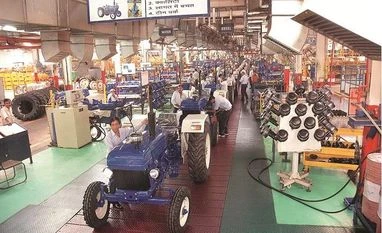After a quarter marked by a rise in delinquencies on auto loans, Non-Banking Financial Company (NBFCs) and commercial banks hope to do better in the second half of the fiscal as Indians shop for festivals and economic activity improves.
Amid lockdowns and restrictions for Covid-19, auto NBFCs saw their non-performing assets shoot up quarter-on-quarter as the second wave of Covid-19 reached the hinterlands.
Delinquencies were the sharpest in commercial vehicles (CVs), followed by three wheelers, and the entry level two-wheeler segment. Almost 80 per cent of three-wheelers and 45 per cent of two-wheelers are bought on credit in India, the world’s largest market for such vehicles.
Rakesh Sharma, executive director at Bajaj Auto, said owners are unable to pay their EMI (equated monthly installment) for three-wheelers. “With everything closed he is not earning Rs 25,000 a month, which he was before the pandemic, but Rs 15000, hence the defaults. Till the time the market doesn’t come back, and they are able to ply the three-wheeler for a longer time, their situation will not improve,” said Sharma.
The increase in gross NPAs for Bajaj Finance and Mahindra Financial Services (MFSL), two major NBFCs in the auto segment, was up more than 700 basis points in the three months to June, quarter-on-quarter. Three-wheelers form a major share of the two companies’ auto loans.
Bajaj Finserv’s auto finance business was the worst affected. Its NPA on auto loans as of June 30 rose to Rs 2,307 crore from Rs 1,136 crore on March 2021, according to an investor presentation. This was largely due to two- and three-wheeler loans.
Banks hit as well
It hasn’t been an easy quarter for the banks either. Rajkiran Rai G, managing director and chief executive officer (CEO) at Union Bank, said this has not been normal quarter (Q1FY22). The stress is evident in retail, including auto loans in rural areas, due to health and income issues in aftermath of second wave Covid-19. Many have lost jobs or seen severe pay cuts. There has been substantial restructuring of such loans. "We do not see loans ending up in large scale defaults. The problem is within bank's tolerance limits", said Rai.
Prashant Kumar, managing director and CEO at Yes Bank, said the second Covid-19 wave has gripped both rural and urban India. Jobs and business in the transportation sector suffered in April and May when there was no mobility. Lockdowns and restrictions weighed on loans in the commercial vehicle category in rural areas.
With easing of restrictions and progress of monsoon economic revival will be much faster in rural areas than urban, helping to lessen the burden of stress, Kumar said.
The pain for TVS Credit Services has been less. According to Venkatraman Gopalakrishnan, the company’s CEO, the GNPA levels at TVS Credit have been more or less stable in Q1. “In fact as compared to our benchmark peer group our GNPA levels are much better contained. GNPA increase in FY21 is largely attributed to the impact on our customers’ income, due to pandemic. As things improved in the latter half of Q1FY 22, our collections bounced back strongly. With further easing of restrictions we expect to be back to pre Covid levels,” he said.
The NPA trend is very “product agnostic”, said Ramesh Iyer, managing director at MFSL He attributed the trend largely to the hit on rural cash flow because of the pandemic. Close to 90 percent of MFSL’s loan book is accounted for by auto loans.
“Most of these vehicles—be it a passenger three wheeler, truck, bus, or a taxi, are 'earn and pay vehicles'. The only segment which did well was tractor and agri segment. Also, not to forget, that out of the ninety days in the quarter, hardly 20-odd days were operational. In rural India, owing to the state of health infrastructure, even if people had money, they held back payments and saved for exigencies," he said.
Iyer said the rural demand tends to bounce back a lot more quickly as owners of these commercial vehicles need to get back into the business to pay off the liabilities.
Rohit Inamdar, Senior Director at CRISIL Ratings, said as the second wave subsides, financing institutions are expected to make their business models more robust to incorporate resilience to such disruptions in their normal course of business.
“While the focus is on collections from borrowers, lenders would benefit also by evolving suitable business models embracing digitization for origination as well. The pace of vaccinations will be a critical input for a full, unhindered reopening of economic activity. While the country moves towards pre-pandemic normal in several other aspects, digital collections are expected to continue, and digital originations may also make their way, given the low cost of managing these and the ease they offer to borrowers,” said Inamdar.
Unlock 30+ premium stories daily hand-picked by our editors, across devices on browser and app.
Pick your 5 favourite companies, get a daily email with all news updates on them.
Full access to our intuitive epaper - clip, save, share articles from any device; newspaper archives from 2006.
Preferential invites to Business Standard events.
Curated newsletters on markets, personal finance, policy & politics, start-ups, technology, and more.
)